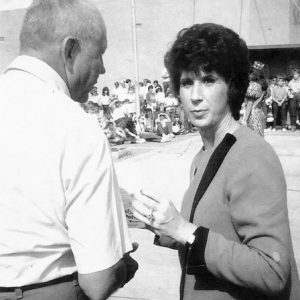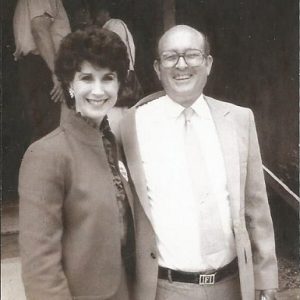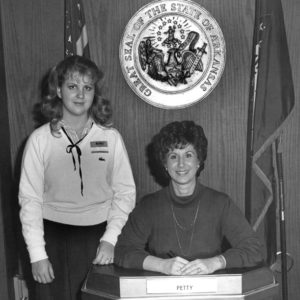calsfoundation@cals.org
Judy Chaney Petty Wolf (1943–)
Judy Chaney Petty Wolf, a political activist and Arkansas state legislator, was deeply involved in the Republican Party as it was developing into a viable electoral challenger of the long-dominant Democratic Party. She gained national attention in 1974 when she ran for a seat in the U.S. House of Representatives, offering the first real challenge that House Ways and Means Committee chairman Wilbur Mills had experienced in over two decades.
Judy Chaney was born on September 4, 1943, in Little Rock (Pulaski County) to John T. Chaney and Jostine Leming Chaney; she had one brother. She graduated with honors from the University of Arkansas at Little Rock. She married a pharmaceutical salesman in about 1963 and had a daughter. The couple divorced in 1967.
In the mid-1960s, she became active in Republican politics. After volunteering in his unsuccessful 1964 gubernatorial campaign, she took a job as a secretary to Winthrop Rockefeller, an heir to the Rockefeller oil fortune. He would go on to be elected governor in 1966 and ultimately serve two terms as governor, from 1967 to 1971, the first Republican to be elected governor since Reconstruction.
Following her work for Rockefeller, Petty herself entered the electoral arena in 1974, winning national attention as the first ever Republican challenger to House Ways and Means Committee chairman Wilbur Mills. In the aftermath of the Watergate scandal and President Richard Nixon’s resignation, 1974 proved to be a bad year for Republican candidates across the nation, but Mills’s involvement with stripper Fanne Foxe shook even his bedrock supporters and attracted national attention to Petty’s challenge. With virtually no formal campaign operation and a bare-bones budget, Petty campaigned diligently, seeking to tie Mills to the problem of inflation that was plaguing the country while also accusing him of having accepted illegal campaign contributions during his short-lived 1972 presidential campaign. While President Gerald Ford, a longtime colleague of Mills, was reluctant to campaign against the still influential legislator, he did pose for a picture with the Republican challenger, and California’s governor, Ronald Reagan, came to Little Rock to campaign on Petty’s behalf. She was defeated, garnering just over forty-one percent of the vote, but she threw a real scare into a man who had long been considered one of the nation’s most powerful political figures. It would prove to be Mills’s final term.
Petty stayed active in the developing party, and two years later, she repaid Reagan for his support when she served as state chairman of the 1976 Reagan for President effort. She also supported his successful campaigns in 1980 and 1984.
She won the first of two terms in the state legislature in 1980. As a member of the minority caucus, she made her mark as the primary backer of legislation concerning justice for crime victims. Petty did not seek a third term; instead, in 1984, she sought the congressional seat being vacated by Ed Bethune, who himself sought to unseat Senator David Pryor. Although Petty won the Republican nomination, she lost the general election to Democrat Tommy Robinson by about five percent of the vote.
After leaving elective office, Petty served as director of public affairs for the American Legislative Exchange Council (ALEC), a conservative organization that distributes draft legislation among state governments, as well as public affairs consultant to the U.S. Department of Transportation. She also served as a representative of the U.S. at North Atlantic Treaty Organization (NATO) conferences in France, Belgium, England, and Germany.
In addition, she reconnected with an old friend, Dr. Robert Wolf, whom she later married. The couple initially lived in Louisiana, while he was associated with Louisiana State University, before moving to Texas after he joined the staff of the University of Texas’s Health Science Center in San Antonio in 1987. In 1989, she too began to work for the center, ultimately serving in a number of advancement and public relations positions over fifteen years, most prominently as senior vice president for external affairs. She oversaw fundraising, communications, and media relations, with many of the videos and publications produced on behalf of the center garnering awards. She and her husband both retired from the center in 2006.
For additional information:
“Filing by Petty Sets Republican Candidacy for Seat in Congress.” Arkansas Gazette, March 30, 1984, p. 12A.
Hall, Becky. “She’ll Be Glad to Take His Seat in Congress.” Arkansas Gazette, April 14, 1974, pp. 1D, 3D.
Judy Petty Papers (UALR MS.0277). Center for Arkansas History and Culture. University of Arkansas at Little Rock, Little Rock, Arkansas.
“June 28 Retirement Ceremony to Honor the Wolfs.” HSC News, UT Health Science Center. http://uthscsa.edu/hscnews/singleformat.asp?newID=2109 (accessed November 30, 2020).
Squires, Jim. “Mills Caper: Not the Wilbur of Back Home.” Chicago Tribune, October 17, 1974.
“Wilbur’s Other Problem Is Judy Petty.” People, October 28, 1974. Online at http://www.people.com/people/archive/article/0,,20064605,00.html (accessed November 30, 2020).
William H. Pruden III
Ravenscroft School
 Divergent Prosperity and the Arc of Reform, 1968–2022
Divergent Prosperity and the Arc of Reform, 1968–2022 Women
Women Judy Petty Badge
Judy Petty Badge  Judy Petty Campaign
Judy Petty Campaign  Judy Petty in Cabot
Judy Petty in Cabot  Judy Petty
Judy Petty 




Comments
No comments on this entry yet.